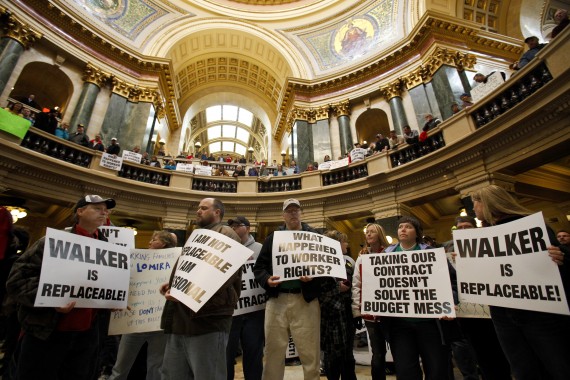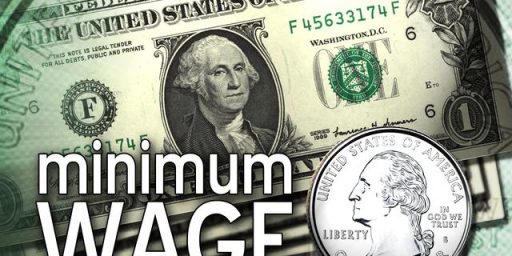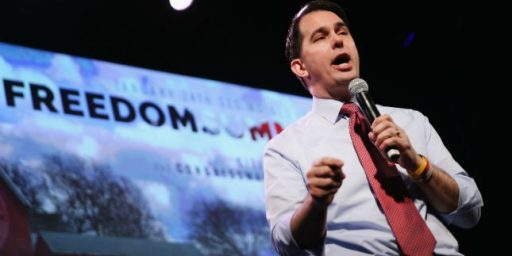Wisconsin and Practical Politics (Not to Mention Compromise)
Why can't the Wisconsin Stand-off end in compromise?
 As the multi-week standoff in Wisconsin continues I can’t help but continuing to think that this is all so unnecessary (the whole Senators on the Run bit, not to mention sleep-ins and the like). If the main issue is the state’s fiscal difficulties, then surely the most salient issue at hand is whether or not teachers and other public sector workers in the state increase the amount of money that they contribute to their benefits.
As the multi-week standoff in Wisconsin continues I can’t help but continuing to think that this is all so unnecessary (the whole Senators on the Run bit, not to mention sleep-ins and the like). If the main issue is the state’s fiscal difficulties, then surely the most salient issue at hand is whether or not teachers and other public sector workers in the state increase the amount of money that they contribute to their benefits.
Specifically, as Walker’s budget repair bill dictates:
Pension contributions
Requires employees who pay into the Wisconsin Retirement System to contribute 50 percent of their annual pension payment. That amount is estimated to be 5.8% of salary in 2011.
Health insurance contributions
Requires state employees to pay at least 12.6% of the average cost of annual premiums. Require changes to the plan design necessary to reduce current premiums by 5%. Local employers participating in the Public Employers Group Health Insurance plan would be prohibited from paying more than 88% of the lowest cost plan.
This strikes me as reasonable in a variety of ways. And, indeed, the public employees in question appear ready to accept these concessions:
Top leaders of two of Wisconsin’s largest public employee unions announced they are willing to accept the financial concessions called for in Walker’s plan, but will not accept the loss of collective bargaining rights.
This is from a story dated February 19th, so the chance for a compromise on the immediate issues has been on the table for some time. As such, the main issue in terms of the overall impasse is the collective bargaining issue, including permanent changes regarding pay raise into the future. On that latter point, the system proposed by Walker basically guarantees that public employees could never expect to see a wage increases beyond what would be needed to keep pace with inflation:
Total wage increases could not exceed a cap based on inflation unless approved by referendum. Contracts would be limited to one year and wages would be frozen until a new contract is settled. (source)
Let’s face facts: the odds that the voters are likely to vote for pay increases are pretty low. As such, this provision of Walker’s bill basically would create a system wherein current wages for public sector employees would be frozen at current levels adjusted for inflation. If you were being told this was your future, you might protest as well.
At a minimum, it seems to me that it would make sense for a compromise to be reached wherein the immediate fiscal issues are addressed (i.e., greater contribution by public sector workers to their benefits), establish some sort of multi-year moratorium on changes to the current benefit and wage packages, and with the issue of the exact relationship between Wisconsin and its public employees to be revisited at the end of the moratorium.
Such a move strikes me as prudent and in the state’s interest—it certainly sounds a lot more like good governance than does the current situation. However, sadly, the goal at the moment does not seem to be good governance.
As I like to say, compromise is the essence of democracy, and it seems that this situation is one that begs for some prudent compromise. And, I will note in conclusion, it isn’t as if Walker has slam-dunk super-majority support in his state (for example, see here). Such a situation means that both from a good governance/democracy perspective, as well as a self-interested political one, Walker ought to be thinking a bit more about compromise than he currently appears willing to do.






Steven –
How do you negotiate with a person (Walker) who will not negotiate? The Unions have already given concessions, showing their willingness to negotiate.
Walker? Not so much.
Well, like I said:
Indeed, everything is the post puts the onus on Walker.
Governor Walker is just the most prominent example of how those on the far-right refuse to compromise or even recognize that other points of view might be just as valid as their own. Unfortunately, I fear this trend will continue until the American public gets tired of Republicans acting like childish bullies.
What is about the word bankrupt do you people not understand? Public sector unions are the ruination of this country(even FDR saw that) and Walker should be applauded for trying to reign them in.
That question needs to be asked of politicians like Walker who pass tax cuts for corporations and the wealthy…unless you really believe that taking in less money will help to avoid bankruptcy…oh, and it’s amusing to see so many people agreeing with FDR on this issue who otherwise might trash him on so many other issues…
You know, compromising into a bad deal isn’t really smart. Nor is it particularly ‘right wing’. A bad deal is a bad deal.
I think Walker correctly identified the issues. A fiscal fix–raising public employee contributions–is a one-time affair. As long as unions hold power over politics, it’s not a permanent fix. The next congress could simply say, ‘Oh, poor unions, let us kiss that and make it better… here’s a new benefits package for you.’
Getting the unions out of the public’s business is a longer-term solution. Keeping them out will take discipline, not a vastly available commodity, I fear, but it can be done.
Again, I’m not speaking as a ‘right winger’; I do not believe public employees should be unionized at all.
Sorry Steven, but have you been asleep since this battle began. You sound slightly mystified by the whole affair. Has it not been clear from day one of this mess that Walker’s aim is to destroy the unions, which is why he ‘ought to be thinking about compromise’ but never will.
My suggestion? Scrap the above post and replace with..because the guy’s a nut.
“As such, this provision of Walker’s bill basically would create a system wherein current wages for public sector employees would be frozen at current levels adjusted for inflation.”
Base pay is frozen w/ COLA, which I assume most Wisconsinites have experienced the last few years at best. Individual merit and performance pay is not frozen, but it’s not subject to collective bargaining.
“Getting the unions out of the public’s business is a longer-term solution. Keeping them out will take discipline, not a vastly available commodity, I fear, but it can be done.”
Not allowing public employees to unionize is a violation of their right to free association.
@cian:
No, not mystified, nor asleep. Just expressing a preference, and knowing full well that said preference is unlikely to be pursued.
You oppose a closed shop, then?
“Base pay is frozen w/ COLA, which I assume most Wisconsinites have experienced the last few years at best.”
I doubt most Wisconsinites are facing that as a permanent policy. Assume that it is possible to have significant economic growth w/o inflation. What happens then? If teachers are willing to take pay cuts when the state needs them to do so, which appears to be the case here, what benefit derives from removing the ability to negotiate? Has this been a problem in the past?
Steve
“How do you negotiate with a person (Walker) who will not negotiate?”
Walker was a D student in college before he dropped out.
I wouldn’t expect much in the way of intellectual firepower from him.
He’s a wooden headed Koch Whore.
steve, legislation is never permanent.
WE WON and are proceeding to install breathalyzers into your Hybrid….
The essence of democracy is representing the will of the people. Compromise is the essence of politics.
The majority of the legislative bodies are in favor of the reforms as well as the chief executive. Under the basic principles of democracy it should pass and be made law. Busting unions? Maybe. Draconian? Maybe. Democratic? Certainly.
Public workers can associate with whoever they want but being represented by a union in collectively bargaining is a privilege that can be revoked. It should be revoked for a number of reason.
Well,
1) There is no singular “will of the people” and hence the need to compromise.
2) The need for compromise depends on the type of politics. There isn’t, for example, much compromise in the totalitarian politics of North Korea.
@Steve:
Although I will agree that if, at the end of the day, protest and the quorum busting fails, then the vote should be taken and the majority in the legislature should prevail.
My basic point, though, is that there is clear division in Wisconsin, even given the electoral results, and hence compromise is a reasonable position to take given the overall situation.
Steve,
As we now know, Walker kept his union busting plans to himself during the election, knowing full well he would not have been elected had he discussed taking such radical steps against public sector workers.
Dishonest? certainly. Scumbag politics? Definitely? Democracy? Only if you hate the very idea.
So your preference is that they punt and not to the hard work for a permanent solution? Well, that’s one way to be a loser politician.
Or Walker can follow in the footsteps of FDR, that Liberal icon, when in July 1939, he told union backed striking WPA workers “You cannot strike against the Government.” And then fired 20,000 the next day for failure to show up for work after 5 days.
And what were the WPA strikes over? Union workers upset new legislation required them to put in the full 130 hrs/month for their pay rather than charging it out at the higher “union” wage which permitted many to get their Relief check then go out and find private work. The law was passed to cut costs and combat “shirking and chiseling.” And interestingly, the next week, Republicans and anti-New Deal Democrats passed the Hatch Act to combat political influence in the WPA, U.S. district attorneys and tax collectors, including political favors for Relief jobs.
Dr. Taylor, this guy here, sound like one of the runaway senators not to mention almost every single one of my fellow “pro union” citizens. The ones that I have seen on the news, talked to in the streets and that have had kick me off of their friends list on Facebook. I poop you not.
Well wr seems just a bit more rational and much less vitriolic and seethingly hateful .
You cannot compromise with a clueless raging mob.
Side note. I am on my best behaviour and most understanding restraint when dealing with them. The ones I talk to and interact with.
My favorite part is how Walker created the financial mess with his tax cuts to the rich and corporations and yet he doesn’t get blamed for such reckless behavior..
JKB — Your admiration for FDR is duly noted. Let me know when you’re ready to start advocating for a public works program to give people jobs.
The essential virtue of a republic is moderation. Compromise, defined as a mechanical splitting of the difference, may or may not be moderate. So, for example, when one faction want to build a bridge across a river and the other doesn’t, building a bridge halfway across the river isn’t moderate. It isn’t even compromise.
@Dave:
And where did I define it as such?
Sure, so long as we also forbid the rich and corporations from having power in politics…
Oh you only wanted to render the poor and working class impotent so the rich could continue to abuse them? I see.
This really hard for some folks to understand. The State of Wisconsin is out of money. There is nothing to compromise on. The Governor states his case clearly. He won the eleciton, and to quote Obama, He won. Elections have consequences. Finally the tax payers are being represented by Governent not the Unions.
Matt are you aware of what the previous administration did prior to Walker’s election. Your statement stunk so bad I could smell it over the internet. You are really full of it and we know what it is.
This is I think the most relevant comment in the whole thread in pointing out what’s really at stake… ultimately, this is a battle in a larger war of perception over who holds power over politics.
Regardless of who is in power, both sides typically play the “victim” card*: see the meme reproduced on talk radio for most of the early 2000’s that perpetuated the idea that despite controlling both houses of congress and the presidency, Republicans/Conservatives were under the thumb of X form of oppressive liberals.
In many respects on the Right this culminates in the Tea Party — who beyond issues of financial governance are clearly concerned with fear that they are losing/have lost not only a way of life, but control/power over government at the local, State, and Federal level.
As Steven and other have pointed out, this, in the end, had nothing to do with the budget and everything to do with taking bargaining power away from the Unions. And in this respect, the move to do so assume a zero-sum power dynamic where, once lost, it can only be regained by a forceful redistribution.
[*] – My lack of examples of liberals making similar claims about “whose really in power” is in part because I’m drawing a blank, and in part because I personally don’t want to suggest that concerns about corporate power (the only example that immediately came to mind) are overstated or irrational (which also shows my personal bias).
“The State of Wisconsin is out of money.”
Which of course explains why the incoming governor’s first act was to give away large tax breaks for the wealthy. If balancing the budget were the only concern (1) he would seek to undo the tax breaks, and (2) he would have long since accepted the unions’ offer to accept the pension and benefit cuts.
Please mention this to Mataconis before he tries to interpret poll results again.
@Stoned
“Finally the tax payers are being represented by Governent not the Unions.”
One group of taxpayers, anyway: Pew Poll: Only Wealthiest Income Bracket Sides With Gov. Walker Over Unions.
I wasn’t responding to you, Steven T., but to Steven Plunk who made a remark contrasting the essence of democracy with the essence of compromise. Truth be told neither of you defined compromise but it’s easy enough to find the definition i referred to around the ‘sphere. As should be inferred, I wouldn’t characterize that as compromise but as fanaticism masquerading as compromise.
Perhaps rewarding civil disobedience, lawbreaking, and anti-democratic actions by elected legislators isn’t a smart compromise and will only lead to more demands, more civil disobedience more lawbreaking, and more anti-democratic actions by elected legislators.
Just curious, but what compromises have public employee unions in Wisconsin made in the ten years before Governor Walker finally pushed back?
I certainly couldn’t say and I really don’t think it is relevant one way or another. This isn’t a sporting event where the issue is who scored last.
What I do know is that they have signaled a willingness to increase contributions to their benefits in a way that will decrease their take home pay and some other concessions. That is on the table right now and would help address the fiscal issues facing the state.
Well, socialogically speaking, pendulums always seem to swing too far.
People do like to use that metaphor, but that doesn’t mean that there is any validity to it. One had to actually deal with the actual facts rather than simply assuming a given moment in times represents an upswing of the pendulum, yes?
And, in honesty, I am unaware of a sociological law that states that life is really like that.
? That is on the table right now and would help address the fiscal issues facing the state.
Which would be great if this was about fiscal responsibility. It’s not. It’s about Walker making his bones with the right…